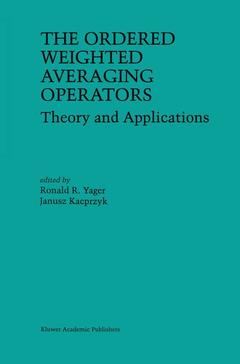The Ordered Weighted Averaging Operators, Softcover reprint of the original 1st ed. 1997 Theory and Applications
Langue : Anglais
Coordonnateurs : Yager Ronald R., Kacprzyk J.

Aggregation plays a central role in many of the technological tasks we are faced with. The importance of this process will become even greater as we move more and more toward becoming an information-cent.ered society, us is happening with the rapid growth of the Internet and the World Wirle Weh. Here we shall be faced with many issues related to the fusion of information. One very pressing issue here is the development of mechanisms to help search for information, a problem that clearly has a strong aggregation-related component. More generally, in order to model the sophisticated ways in which human beings process information, as well as going beyond the human capa bilities, we need provide a basket of aggregation tools. The centrality of aggregation in human thought can be be very clearly seen by looking at neural networks, a technology motivated by modeling the human brain. One can see that the basic operations involved in these networks are learning and aggregation. The Ordered Weighted Averaging (OWA) operators provide a parameter ized family of aggregation operators which include many of the well-known operators such as the maximum, minimum and the simple average.
1. Basic Issues in Aggregation.- Kolmogorov’ s theorem and its impact on soft computing.- Possibility and necessity in weighted aggregation.- OWA operators and an extension of the contrast model.- Equivalence of changes in proportions at crossroads of mathematical theories.- 2. Fundamental Aspects of OWA Operators.- On the inclusion of importances in OWA aggregation.- On the linguistic OWA operator and extensions.- Alternative representations of OWA operators.- 3. Mathematical Issues and OWA Operators.- Useful tools for aggregation procedures: some consequences and applications of Strossen ’s measurable Hahn-Banach theorem.- OWA specificity.- Ordered continuous means and information.- 4. OWA Operators in Decision Analysis.- OWA operators in decision making with uncertainty and nonnumeric payoffs.- On the role of immediate probability in various decision making models.- Risk management using fuzzy logic and genetic algorithms.- OWA operators for doctoral student selection problem.- 5. OWA Operators in Multicriteria and Multiperson Decision Making.- Beyond min aggregation in multicriteria decision: (ordered) weighted mean, discri-min, leximin.- OWA operators in group decision making and consensus reaching under fuzzy preferences and fuzzy majority.- Applications of the linguistic OWA operators in group decision making.- Aggregation rules in committee procedures.- 6. OWA Operators in Querying and Information Retrieval.- Quantified statements and some interpretations for the OWA operators.- Using OWA operators in flexible query processing.- Application of OWA operatrors to soften information retrieval systems.- Implementation of OWA operators in fuzzy querying for Microsoft Access.- 7. OWA Operators in Learning and Classification.- OWA-based computing: learningalgorithms.- OWA operators in machine learning from imperfect examples.- An application of OWA operators to the aggregation of multiple classification decisions.
This volume is the first in the literature on the increasingly popular Ordered Weighted Averaging (OWA) operators. These OWS operators make it possible to change the form of aggregation from the `pessimistic' minimum-type aggregation through all intermediate types including the conventional arithmetic mean and nonconventional aggregations, to the `optimistic' maximum-type aggregations. Included are contributions from a number of fields where these operators have been applied. These fields are decision analysis under uncertainty, learning and classification, multi-person decision-making and consensus formation, and flexible database querying and information retrieval.
Date de parution : 10-2012
Ouvrage de 347 p.
15.5x23.5 cm
Thèmes de The Ordered Weighted Averaging Operators :
Mots-clés :
algorithms; classification; fuzzy; fuzzy logic; genetic algorithms; learning; machine learning; tools; uncertainty
© 2024 LAVOISIER S.A.S.


